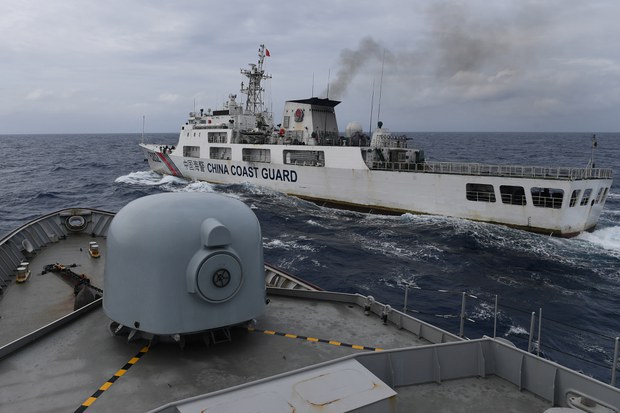ASEAN members to hold first joint drills in contested South China Sea
Share

A China Coast Guard ship is seen from an Indonesian Naval ship during a patrol at Indonesia’s Exclusive Economic Zone to the north of Natuna island, Indonesia, Jan. 11, 2020.
Southeast Asian nations will hold their first joint military exercises in the South China Sea, ASEAN chair Indonesia said Thursday, amid rising tensions between Beijing and Washington in the disputed waterway and Taiwan Strait.
The non-combat drills will take place near Indonesia’s Natuna Islands in September as a show of unity among the 10-member Association of Southeast Asian Nations (ASEAN), Indonesian military officials said.
“All [ASEAN countries] have confirmed that they will attend,” Julius Widjojono, a spokesman for Indonesia’s armed forces, told BenarNews, adding the drill would be an annual event. However, there had been no confirmation from Myanmar on whether it would take part, Julius said. Strife-torn Myanmar is persona non grata at major ASEAN meetings.
China claims nearly the entire South China Sea, including waters within the exclusive economic zones of Taiwan and ASEAN member-states Brunei, Malaysia, the Philippines and Vietnam. While Indonesia does not regard itself as a party to the South China Sea dispute, Beijing claims historic rights to parts of that sea overlapping Indonesia’s exclusive economic zone in and around the Natunas.
Indonesia’s military commander Adm. Yudo Margono, who proposed the ASEAN drill during a meeting of the bloc’s defense forces chiefs on Wednesday in Bali, said the exercises would enhance regional stability.
“Indonesia will continue to promote a safe, peaceful and stable region free from any threats and disturbances that threaten the sovereignty of the states,” Yudo said in a statement Wednesday.
“A safe sea will automatically boost our countries’ economy.”
‘Strong message to the major powers’
The ASEAN drill, dubbed ASEAN Solidity Exercise, or Asec01N, will involve army, navy and air force units from the member-states, and Timor Leste, an observer state. The exercises will focus on maritime security and search-and-rescue operations.
Khairul Fahmi, a military and security analyst at the Jakarta-based Institute for Security and Strategic Studies, said the exercise was a good initiative by Indonesia.
“This is a concrete form of defense diplomacy to build trust, reduce concerns and misunderstandings between countries, especially ASEAN. Plus, there will be many challenges and threats to Indonesia’s national interests,” Fahmi said.
He said Indonesia’s initiative also affirmed its sovereign rights in the North Natuna Sea, which China claims as part of its historical rights marked by a nine-dash line that overlaps with other countries’ exclusive economic zones.
“This is part of ASEAN’s efforts to jointly play a more strategic role in maintaining regional stability,” Fahmi said.
“At the same time, it sends a strong message to the major powers that have interests in the region, especially in the North Natuna Sea, not to ignore ASEAN.”
China has built military installations on some of the islands and reefs it controls in the South China Sea. In 2016, an international tribunal ruled that China’s claims had no legal basis under the 1982 United Nations Convention on the Law of the Sea (UNCLOS), but Beijing rejected the ruling and continues to assert its presence.
Indonesia, Vietnam and Malaysia have accused China of disrupting their oil and gas exploration activities with frequent incursions by Chinese coast guard and maritime militia ships, leading to confrontations. ASEAN and China have been negotiating a code of conduct for years to manage disputes peacefully, but progress has been glacial.
The United States, which is not a claimant but is in a defense treaty with the Philippines, has challenged China’s claims by conducting “freedom of navigation” operations in the waterway.
While officials from some ASEAN states have expressed worry about the possibility of war breaking out between the superpowers over Taiwan, Washington and Manila earlier this year struck a deal to give U.S. forces expanded access to military bases in the Philippines – a move that angered China.
BenarNews is an RFA-affiliated news organization.







